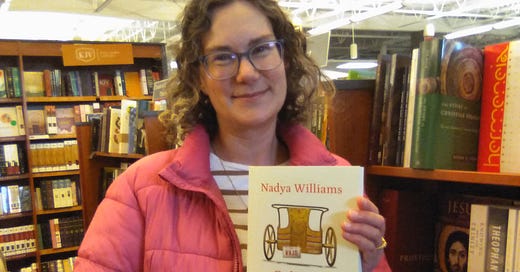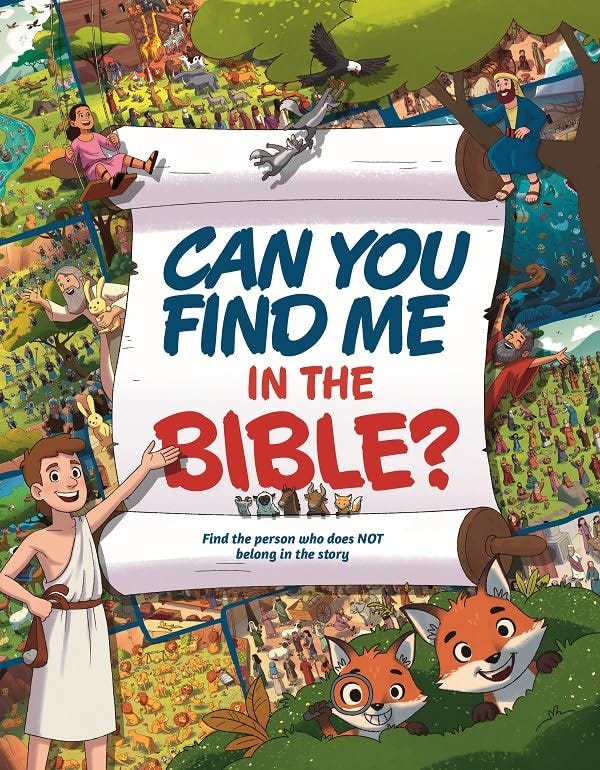Snow and ice were the theme of this January in Ohio. Overnight, they are suddenly mostly melted, but books remain.
I spent part of this week in Grand Rapids, MI, recording lectures to go with my next book—Christians Reading Classics, coming this October from Zondervan Academic. And before I proceed to anything else, I have to say: incredible friends helped my family this week to make it possible for me to make this trip and for my husband to keep doing his day job. We all felt truly overwhelmed by the kindness and love. We never take it for granted!
Speaking of books, physical bookstores have had a hard time of late, and this includes Christian bookstores. But Baker Book House, located just a couple of blocks from Zondervan’s building, is going strong! I was excited to see both of my books on display there, and then I picked up some books for my kids—like this fantastic book that reminded me of “Where’s Waldo?” My nine-year-old and six-year-old have been enjoying this one a lot.
The Big News: Public Life Fellowship
I am delighted to be one of Public Life Fellows for 2025—along with a group of truly fantastic people! I’ve long admired the work of Lydia Dugdale, in particular (for example, see this essay and her book), so I am stunned to be in the same cohort with her.
The fellowship is an initiative of The Center for Christianity and Public Life and fits into the Center’s larger mission “to contend for the credibility of Christian resources in public life, for the good of the public.” Christianity—and Christians—have much good to offer America today, and I am excited to learn from other fellows, program leaders, and wise mentors, and be equipped in my own work to serve the public good.
Elsewhere This Week
My latest for Christianity Today is a review of Volker Leppin’s new biography of Francis of Assisi. A taste:
…the factual stuff alone already presents an impressive body of knowledge. Surely it can yield a coherent biography without compelling the biographer to sift through speculation. Not so fast, Leppin warns. These punctuated elements don’t get us to the real Francis, he argues, just as a laundry list of dates, relationships, friendships, and basic professional achievements can’t sum up the significance of any individual. People are complicated, and people in love with God are perhaps more so than most.
Why was Francis the way that he was? And was he really the way any of the sources portray him, including the most challenging and contradictory source of all—his own writings? The historical and the hagiographical mingle seamlessly, tormenting anyone who would separate fact from fiction. But then, people are never just a collection of facts. Nor are their personalities fixed through all of life.
This seems especially poignant in the case of someone like Francis, so much larger than life. Just who was he emotionally and spiritually? This question, ultimately impossible to answer adequately, fascinates and haunts Leppin in this biography. He admits that the book took shape as something other than a straightforward historical inquiry. “It is a biography,” he writes, “and yet at the same time it is a book about the difficulties of writing a biography, and specifically a biography of Francis of Assisi.”
In Front Porch Republic, I reflect on a serious problem: the in-built AI tools everywhere are making it harder for humans to write on a computer. A taste:
As I opened this file to begin writing, the following message greeted me: “Select an icon or press Alt + i to draft with Copilot.” Meanwhile, Gemini is on standby in my email program, offering to help me write missives or suggesting optimal answers to emails (“Sounds great!” “Of course!” “Let me get back to you!”). As for Google searches, the top result for anything one attempts to find now is AI-generated, which gives me a new appreciation for the encyclopedias and dictionaries of all sorts that take up space on our shelves.
No question about it: For writers like me, who would like nothing more than to do our own writing and thinking with dignity and intellectual honesty, it’s becoming harder to write—at least on a computer…
…my concern is with the idea of outsourcing my creative work, delegating the idea-making and wordsmithing to a machine instead of tinkering on my own with the minutiae of a process that gives me an inordinate degree of delight. If writing were merely a utilitarian task of setting words down to paper only to fulfill the length requirements of particular assignments, perhaps delegating some writing to machines might make sense. Although maybe not even that. When Amazon peddled an AI-authored book on foraging mushrooms last year, it turned out to be a deadly product. But if writing today still is, as it has been for millennia, a task of rendering in words something remarkable, transcendent, utterly beautiful, a way of sharing some facet of reality with other persons—all things people longed to do with words before writing existed!—then something else is afoot. And this something is a function AI could never replace or replicate.
On this thought, let me encourage you to do something lovely, loving, and creative this weekend! Maybe go for a walk, read a book (or several), bake a cake, and enjoy life with the people around you. In this age of encroaching machines, to embrace our humanity is a beautiful—and beautifully theological—celebration of who God has made us to be, limits included.






Congratulations on your successful trip to Michigan! Glad you are home safe and sound. The AI article was well stated. It is all around, making it harder to share one's own thoughts.
Congratulations on being selected as a fellow with CCPL!